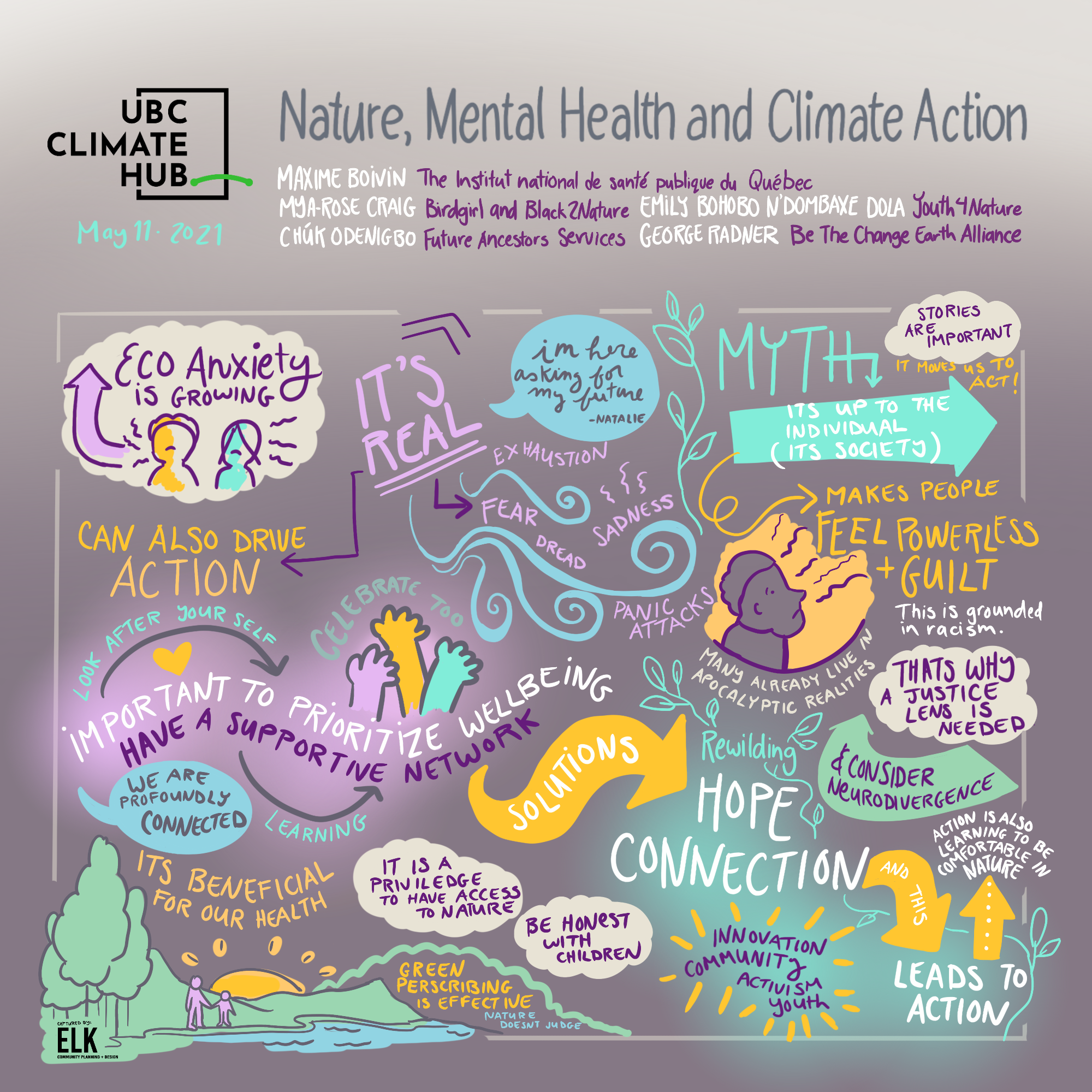
Nature, Mental Health and Climate Action was co-hosted by the Climate Hub at the University of British Colombia and the British High Commission to Canada on 11 May 2020. Marking Mental Health Awareness Weeks in both Canada and the UK, we heard from activists and researchers from both countries on the mental health challenges linked to climate change, why access to nature is so important for wellbeing, and how these issues can inspire climate action.
Author: Meghan Wise
Nature is the tether through which all humans and species anchor our existence. But access to nature in safe, healthy, equitable, and just ways intersects with historical and ongoing systems of oppression and inequity, which create barriers to making and maintaining relationships with nature.
In the summer, we had the honor of partnering with the British Consulate to Canada for a webinar panel discussion event. This event invited community leaders, activists, and academics to explore the interconnectedness of nature, climate change, and mental health and wellbeing. Our five speakers included:
Our discussion began with a dive into issues of eco-anxiety by Dr. Maxime Boivin and the importance of acknowledging and validating the many different ways people and communities are experiencing eco-anxiety pressures. Dr. Boivin highlighted how eco-anxiety can challenge our psychological and collective wellbeing and generate feelings of sadness, anger, existential anguish, isolation, loss, and helplessness or hopelessness.
However, Dr. Boivin also highlights how eco-anxiety can be a catalyst for mobilizing climate action and fostering collective acts of community engagement. Further, that nurturing our connections to nature can help improve overall mental health and wellbeing.
Youth activist and advocate for safe, equitable access to nature, Mya-Rose (popularly known as Birdgirl) shared their experience of starting Black to Nature, a youth-led project that works to connect Black youth and youth of Colour with equitable access to green spaces and fostering meaningful connections with nature.
Mya-Rose notes how this project also connects with the medical practice of “green prescribing.” This means being advised to spend time in nature as a way to address mental health pressures. Connecting youth with nature also helps to foster deeper awareness and engagement with climate action.
Chúk Odenigbo, with Future Ancestors Services and co-founder of The Poison and The Apple, addressed the problem of individualist framing of the ongoing climate crisis. By placing large-scale GHG emissions as the primary fault of individuals, it distracts from the handful of largescale corporations and industries producing the majority of global emissions driving climate change. Individualizing narratives can also foster eco-anxiety.
Individualist narratives can be problematic because as we try to reduce our personal footprint, we continue to see global emissions rapidly rise due to larger industry actions taking place. This can generate a misplaced sense of helplessness or lack of agency in ourselves as failing to take meaningful climate action. When in reality, we just need to collectively shift our focus to industry and policy-making levels that are causing climate change rather than feel defeated and ineffective.
Chúk also weaves in the importance of breaking down climate issues into tangible components of action. Often climate change is seen as a vast and too complex issue with no clear pathways to action. By breaking climate change down into manageable parts and actions, we in turn simultaneously address climate change through each of these processes. This could look like embedding UNDRIP in policy and practices, centering Indigenous ways of knowing, addressing plastic pollution, reducing deforestation practices and empowering youth voices and leaders, moving away from the car-centric culture in urban spaces, and more.
Storytelling Programme Director Emily Bohobo N’Dombaxe Dola then introduced Youth4Nature, a youth-led program that seeks to mobilize youth as leaders and ambassadors for nature and climate. Emily helped to put a spotlight on the mental health challenges and difficulties climate leaders and activists and organizers can face as they regularly engage with complex ecological and climate injustices, systems of oppression and exploitation. Emily also underscores the need for explicitly embedding disability justice within larger climate justice narratives and actions.
Our final speaker for the Nature, Mental Health and Climate Wellbeing Webinar was George Radner of Be The Change Earth Alliance — a community-based organization that seeks to inspire, educate, and empower youth to build a just, sustainable, resilient, and fulfilling world. George explored the deep frustration, sense of hopelessness, or paralysis youth can feel as they watch adults fail to make meaningful or just changes that adequately addresses the urgency of the climate emergency.
George wraps up the discussion seamlessly by outlining three pathways to action. One, root climate action in hope as a way to overcome the paralyzing doom and gloom narratives. Two, foster a sense of agency and a belief in the power of youth voice and mobilization. Three, connecting youth with each other, community, and nature as a way to feel part of a holistic local to the global, interconnected community with the skills, power, and sense of collective solidarity to build a more just and sustainable world.
Overall, this webinar event was a moment of bringing voices, knowledge, and passions together to keep expanding and building a climate community network of action and momentum for collective climate wellbeing, climate justice, and climate action.
